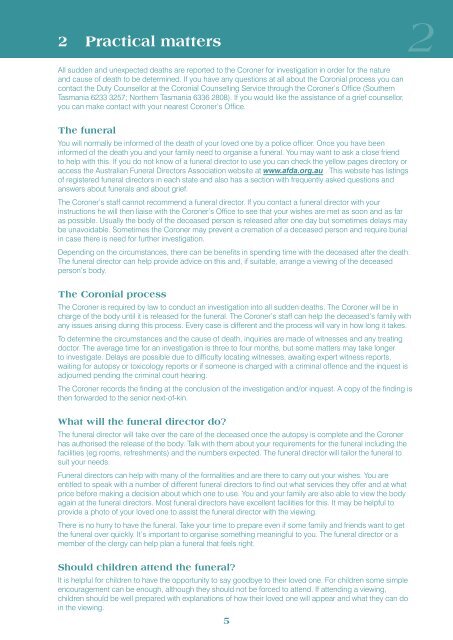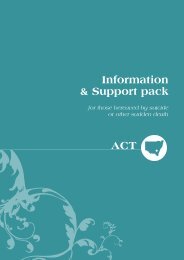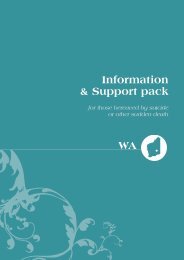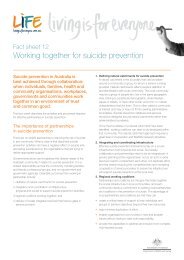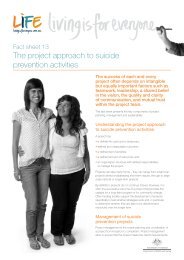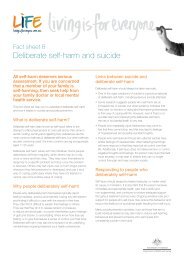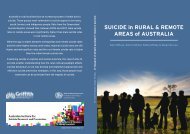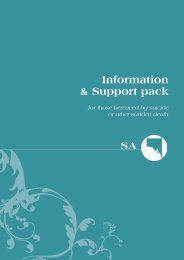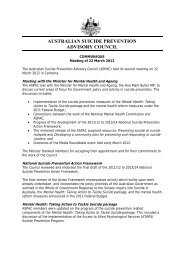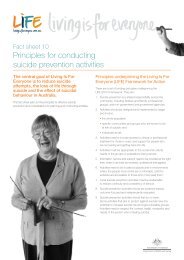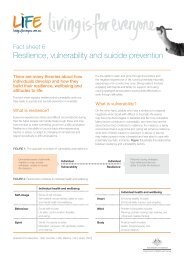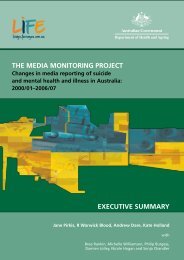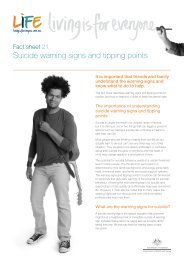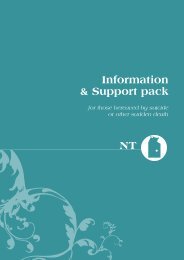Information & Support pack TAS - Living is for Everyone
Information & Support pack TAS - Living is for Everyone
Information & Support pack TAS - Living is for Everyone
- No tags were found...
You also want an ePaper? Increase the reach of your titles
YUMPU automatically turns print PDFs into web optimized ePapers that Google loves.
2 Practical matters2All sudden and unexpected deaths are reported to the Coroner <strong>for</strong> investigation in order <strong>for</strong> the natureand cause of death to be determined. If you have any questions at all about the Coronial process you cancontact the Duty Counsellor at the Coronial Counselling Service through the Coroner’s Office (SouthernTasmania 6233 3257; Northern Tasmania 6336 2808). If you would like the ass<strong>is</strong>tance of a grief counsellor,you can make contact with your nearest Coroner’s Office.The funeralYou will normally be in<strong>for</strong>med of the death of your loved one by a police officer. Once you have beenin<strong>for</strong>med of the death you and your family need to organ<strong>is</strong>e a funeral. You may want to ask a close friendto help with th<strong>is</strong>. If you do not know of a funeral director to use you can check the yellow pages directory oraccess the Australian Funeral Directors Association website at www.afda.org.au . Th<strong>is</strong> website has l<strong>is</strong>tingsof reg<strong>is</strong>tered funeral directors in each state and also has a section with frequently asked questions andanswers about funerals and about grief.The Coroner’s staff cannot recommend a funeral director. If you contact a funeral director with yourinstructions he will then lia<strong>is</strong>e with the Coroner’s Office to see that your w<strong>is</strong>hes are met as soon and as faras possible. Usually the body of the deceased person <strong>is</strong> released after one day but sometimes delays maybe unavoidable. Sometimes the Coroner may prevent a cremation of a deceased person and require burialin case there <strong>is</strong> need <strong>for</strong> further investigation.Depending on the circumstances, there can be benefits in spending time with the deceased after the death.The funeral director can help provide advice on th<strong>is</strong> and, if suitable, arrange a viewing of the deceasedperson’s body.The Coronial processThe Coroner <strong>is</strong> required by law to conduct an investigation into all sudden deaths. The Coroner will be incharge of the body until it <strong>is</strong> released <strong>for</strong> the funeral. The Coroner’s staff can help the deceased’s family withany <strong>is</strong>sues ar<strong>is</strong>ing during th<strong>is</strong> process. Every case <strong>is</strong> different and the process will vary in how long it takes.To determine the circumstances and the cause of death, inquiries are made of witnesses and any treatingdoctor. The average time <strong>for</strong> an investigation <strong>is</strong> three to four months, but some matters may take longerto investigate. Delays are possible due to difficulty locating witnesses, awaiting expert witness reports,waiting <strong>for</strong> autopsy or toxicology reports or if someone <strong>is</strong> charged with a criminal offence and the inquest <strong>is</strong>adjourned pending the criminal court hearing.The Coroner records the finding at the conclusion of the investigation and/or inquest. A copy of the finding <strong>is</strong>then <strong>for</strong>warded to the senior next-of-kin.What will the funeral director do?The funeral director will take over the care of the deceased once the autopsy <strong>is</strong> complete and the Coronerhas author<strong>is</strong>ed the release of the body. Talk with them about your requirements <strong>for</strong> the funeral including thefacilities (eg rooms, refreshments) and the numbers expected. The funeral director will tailor the funeral tosuit your needs.Funeral directors can help with many of the <strong>for</strong>malities and are there to carry out your w<strong>is</strong>hes. You areentitled to speak with a number of different funeral directors to find out what services they offer and at whatprice be<strong>for</strong>e making a dec<strong>is</strong>ion about which one to use. You and your family are also able to view the bodyagain at the funeral directors. Most funeral directors have excellent facilities <strong>for</strong> th<strong>is</strong>. It may be helpful toprovide a photo of your loved one to ass<strong>is</strong>t the funeral director with the viewing.There <strong>is</strong> no hurry to have the funeral. Take your time to prepare even if some family and friends want to getthe funeral over quickly. It’s important to organ<strong>is</strong>e something meaningful to you. The funeral director or amember of the clergy can help plan a funeral that feels right.Should children attend the funeral?It <strong>is</strong> helpful <strong>for</strong> children to have the opportunity to say goodbye to their loved one. For children some simpleencouragement can be enough, although they should not be <strong>for</strong>ced to attend. If attending a viewing,children should be well prepared with explanations of how their loved one will appear and what they can doin the viewing.5


